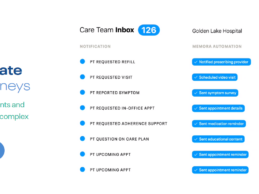Over the past several years, nearly all of the leading health systems in the United States have adopted some form of AI, such as machine learning (ML) or natural language processing (NLP), to assist in managing healthcare operations. The unprecedented growth and development of AI has been instrumental in transforming health system administration, healthcare data analytics and patient diagnosis and treatment.
Despite this growth, health systems have yet to maximize the potential of AI to
Read More
Healthcare Delivery | Patient Care | Health IT & Digital Health Impact | News, Analysis, Insights - HIT Consultant
Crisis in the U.S. Healthcare Workforce: Why It’s Time to introduce AI
One of the many acute challenges during the pandemic has been the departure of approximately 18% of the U.S. healthcare workforce,4 resulting in staffing shortages in hospitals. This has impacted the well-being of the remaining healthcare practitioners 5 as well as their patients – many of whom are deferring care that is vital to disease management and overall maintenance of health,6,7 or who do not have access to timely emergency care.1 Though such challenges may be perceived as insurmountable
Read More
Healthcare Is A Cyber Criminal’s Dream, But It Doesn’t Have To Be This Way
Healthcare is a cyber criminal’s dream. It presents the intersection of a data treasure trove, weak security posture, limited resources, complicated supply chain, and patient care delivery. When faced with having to pick a priority to optimize for, healthcare will, of course, always pick delivering healthcare. This means that when tradeoffs must be made and resources are limited immediate patient care is prioritized over anything else.
A great example of this is looking at how
Read More
Why The Future of Healthcare Interfaces is Fluid
Tools we use to do our daily work have rapidly evolved following deep human-computer interaction (HCI) research. However, when it comes to healthcare, the HCI research has not found its way to healthcare practice. Most healthcare professionals still rely on memory, experience, pen & paper and difficult-to-use healthcare software. The future of medical tools needs to be catalytic as opposed to a hindrance. In this piece, we attempt to untangle the set of tools used in healthcare today
Read More
Memora Health Nabs $40M to Scale Virtual Care Delivery Platform
What You Should Know:
- Memora Health, a San Francisco, CA-based technology platform for virtual care delivery and complex care management, today announced the completion of a $40 million financing led by Transformation Capital with participation from Andreessen Horowitz, Frist Cressey Ventures, Edward Elmhurst Health, AlleyCorp, and others. As part of the financing, Todd Cozzens, Managing Partner at Transformation Capital, will join Memora's board.
- Memora continues to rapidly grow with
Read More
UpLift Raises $8M to Integrate Psychiatry with Mental Healthcare Delivery Platform
What You Should Know:
- UpLift, a vertically integrated mental healthcare delivery platform raises $8M in secondary funding which they plan to allocate to expand their hybrid model services to include psychiatric treatments in an effort to close the behavioral healthcare gap and optimize the appropriate plan of care.
UpLift, the first vertically integrated mental healthcare delivery system, announced their expansion into psychiatry as well as the closing of $8M in secondary funding led
Read More
UK ED Dept. Shows Poor Usability for Major EHRs, Survey Finds
What You Should Know:
- Emergency doctors in the UK have said many electronic health records (EHRs) in use are close to being unacceptable, and this is likely to be having a negative impact on patient care.
A national survey of more than 1500 members and fellows of the Royal College of Emergency Medicine ranked the usability of the major EHRs in use across the UK. All fell short of internationally recognized usability standards.
It led NHS CCIO Simon Eccles to remark that 'too little
Read More
How the Pandemic is Accelerating the Shift to Alternative Care Delivery Models
The COVID-19 pandemic has transformed how we interact with one another, with businesses, and with the world around us. From social distancing to hand sanitation to remote working, its impact on society is immense. And among the various industries that are experiencing significant change as a result of the pandemic, healthcare tops the list. Supply chain disruptions, crowded ICUs and exhausted medical staff has taken a toll on hospitals and clinics — and they’ve had to pivot rapidly to new
Read More
Why A Smart Command Center Requires A Health Cloud Platform
Aviation, military, NASA, or even utilities like the New York Power Authority—almost all high-consequence, complex organizations have one thing in common: a command center. The concept of a command center or a ‘war room,’ or ‘air traffic control’ has been around for a while. Command centers help counter logistical challenges, enable cross-collaboration and guide decision-making with state-of-the-art technology and communications. With them it seems there is absolutely nothing that cannot be
Read More
Data-Driven Future: Impact of Machine Learning on Diabetes Management
“Information technology and business are becoming inextricably interwoven. I don't think anybody can talk meaningfully about one without the talking about the other” – Bill Gates wrote this in 1999 and, nowadays, the same can certainly be said about information technology and healthcare.
The ability to collect, analyze, and use data is becoming ubiquitous with many of healthcare’s most exciting advancements. Whether it’s Google’s DeepMind using artificial intelligence (AI) to help
Read More










